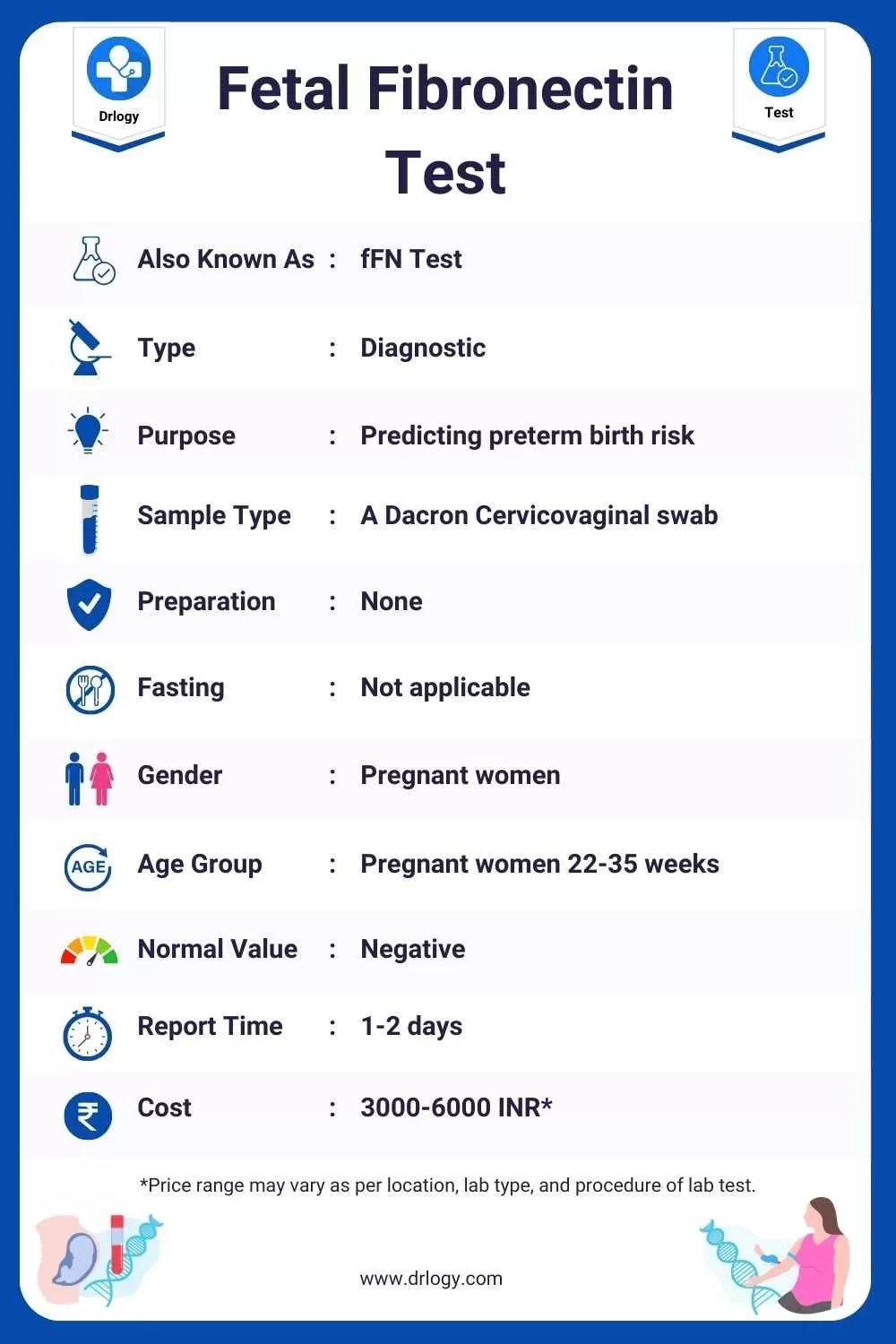
The Fetal Fibronectin Test helps predict premature birth risk in pregnant women, aiding in timely intervention for healthier pregnancies.
Here are the basic details of the Fetal Fibronectin Test.
| Also Known As | fFN Test |
| Type | Diagnostic |
| Purpose | Predicting preterm birth risk |
| Sample Type | A Dacron Cervicovaginal swab |
| Preparation | None |
| Fasting | Not applicable |
| Gender | Pregnant women |
| Age Group | Pregnant women between 22-35 weeks |
| Normal Value | Negative |
| Reporting Time | 1-2 days |
| Cost | 3000-6000 INR* |
*Price range may vary as per location, lab type, and procedure of lab test.
Fetal Fibronectin Test assesses the risk of premature birth in pregnant women.
The purpose of the Fetal Fibronectin Test is to:

Here is the basic preparation for the Fetal Fibronectin Test.
Here is the basic Fetal Fibronectin Test Procedure.
Here is the normal range of the Fetal Fibronectin Test.
| Test | Normal Result |
|---|---|
| Fetal Fibronectin Test | Negative (indicates low risk of imminent preterm birth) |
Here is the Interpretation of the Fetal Fibronectin Test.
| Test Result | Interpretation |
|---|---|
| Positive | Suggests increased risk of preterm birth; closer monitoring required |
| Negative | Indicates low risk of imminent preterm birth; routine prenatal care continues |
Here are some possible causes of positive fFN Test.
| Causes | Effects |
|---|---|
| Increased preterm risk | Elevated fFN levels indicate a higher risk of preterm birth. |
| Cervical changes | Detection of fFN may suggest cervical changes associated with preterm labor. |
| Preterm labor symptoms | Presence of fFN in symptomatic women may indicate an increased risk of preterm labor. |
| Complications prediction | fFN can help predict potential complications in the neonate due to preterm birth. |
| Medical management | Positive fFN results may lead to closer monitoring and potential interventions. |
A positive Fetal Fibronectin Test suggests an increased risk of preterm birth and the need for closer monitoring and potential interventions.
Here are some possible causes of negative fFn Test.
| Causes | Effects |
|---|---|
| Low risk of preterm birth | A negative fFN test indicates a low risk of imminent preterm birth. |
| Normal cervical condition | Absence of fFN may suggest a stable cervix without significant changes. |
| Routine prenatal care | Negative fFN results support routine prenatal care continuation. |
| Minimal neonatal risk | Reduced risk of neonatal complications due to preterm birth. |
| Reduced interventions | Negative fFN results decrease the need for preterm labor interventions. |
A negative Fetal Fibronectin Test suggests a low risk of preterm birth, stable cervical condition, and reduced neonatal risk.
Here are the specimen requirements for the Fetal Fibronectin Test.
|
Specimen |
A Dacron Cervicovaginal swab |
|
|
Volume |
1 FFN tube with buffer |
|
|
Container |
ADEZA collection kit |
|
|
Collection |
Freeze after collection. Ship frozen. |
|
|
Storage |
Freeze |
|
|
Sample Stability |
Temperature |
Period |
|
Room temperature |
<8 hours |
|
|
Refrigerated |
3 days |
|
|
Frozen |
6 weeks |
|
|
Causes for Rejection |
Sample held at room temperature for >8 hours. |
|
Here is the basic limitation of Fetal Fibronectin Test.
Here are some of the risk factors of the Fetal Fibronectin Test.
Here are the Doctor's recommendations or consult a specialist after the Fetal Fibronectin Test.
| Test Result | Doctor to Visit | Reason |
|---|---|---|
| Positive | Obstetrician | Preterm labor risk management |
| Negative | Prenatal care | Continue routine prenatal care |
Here are the estimated Fetal Fibronectin Test Prices in India with different top cities:
|
City |
Price Range (INR)* |
|
3000-6000 |
|
|
3000-6000 |
|
|
3000-6000 |
|
|
3000-6000 |
|
|
3000-6000 |
|
|
3000-6000 |
|
|
3000-6000 |
|
|
3000-6000 |
|
|
3000-6000 |
|
|
3000-6000 |
|
|
3000-6000 |
|
|
3000-6000 |
|
|
3000-6000 |
|
|
3000-6000 |
*Prices are approximate and vary depending on a specific laboratory or healthcare facility.
Summary
Overall, The Fetal Fibronectin Test helps predict preterm labor risk in pregnant women. A positive result may lead to preterm birth prevention measures. Also check Drlogy Test for detailed information about all medical tests for patients, doctors, scholers and medical students.
Reference
Drlogy Testclose
Copyright © 2024 Drlogy. All rights reserved.